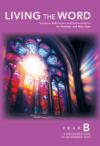Scripture Study for
The Epiphany of the Lord
Isaiah 60:1–6 / Psalm 72: 11 / Ephesians 3:2–3a, 5–6 / Matthew 2:1–12
<< Back to LECTIONARY RESOURCES
Understanding the Word
By Br. John R. Barker, OFM
Throughout the last chapters of Isaiah, from the post-exilic period, we find an emphasis on the coming glory of Jerusalem (representing the land and its people) when, at long last, the Lord returns to his city. The unprosperous and actually quite pitiful state of Jerusalem at the time of this oracle could easily be understood as a situation of “gloom” and “darkness.” Thus we have a strong emphasis on light, shining, and radiance in the first verses. God’s own presence will overcome the current dark circumstances. The radiance of the revitalized city will reveal the divine glory, which will draw others to the city to pay homage (and brings gifts) to this glorious, saving God.
In his Letter to the Ephesians, Paul has been emphasizing that God’s plan for all of humanity has entered its final (albeit protracted) stage, in which all peoples are reconciled to God and to one another in Christ, making of all of humanity a single people. This plan is the mystery made known to Paul by revelation. With the coming of the Spirit, this plan—which had previously been hidden or only faintly hinted at in Israel’s past—was made fully known. A key aspect of that plan is that Gentiles, along with Jews, will be children of God and thus coheirs of the promises first made to Abraham.
Although tradition refers to them as “three kings,” the magi are really scientists and scholars. As such, they represent the wisdom of their time and place. It is this wisdom that has led them to recognize the birth of a new king and to seek him out. It also allows them to recognize the king born not in a palace, but in a simple “house.” Finally, it allows them to hear and heed the warning not to trust Herod. As wise men, the magi represent those who, in Israel’s scriptures, have such open minds and hearts that they are able to recognize the work of God in the most unlikely and unexpected circumstances.
